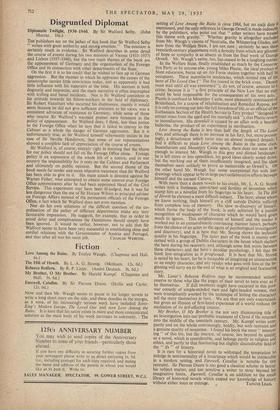Disgruntled Diplomat
THE publishers say on the jacket of this book that Sir Walford Selby "writes with great authority and strong emotion." The emotion is certainly much in evidence. Sir Walford describes in some detail the course of events during his two missions at Vienna (1933-1937) and Lisbon (1937-1940), but the two main themes of the book are the appeasement of Germany and the organisation of the Foreign Office and its connection with other departments of the State.
On the first it is to his credit that he wished to face pp to German aggression. But the manner in which he appraises the causes of the catastrophe carries little conviction today, just as apparently it had little influence with his superiors at the time. His account is both dogmatic and imprecise, and the main narrative is often interrupted with trifling and banal incidents. Nor is Sir Walford consistent in his attitude towards his fellow-workers in the field of diplomacy. Sir Robert Vansittart who incurred his displeasure, mainly it would seem because he did not give sufficient attention to his views, was a consistent advocate of resistance to Germany, while some of those who receive Sir Walford's warmest praises were foremost in the policy of appeasement. Sir Walford does, I think, less than justice to the Foreign Office when he says that it failed to convey to the Cabinet as a whole the danger of German aggression. But it is unfortunately true, as Sir Walford himself vehemently insists in the case of Sir Neville Henderson, that some of our representatives showed a complete lack of appreciation of the course of events.
Sir Walford is, of course, entirely right in insisting that the blame for our policy should not fall on the Foreign Office alone. Foreign policy is an expression of the whole life of a nation, and in our country the responsibility for it rests on the Cabinet and Parliament and ultimately on public opinion. But the second theme of the book needs far cooler and more objective treatment than Sir Watford has been able to give to it. His main attack is directed against Sir Warren Fisher, who attempted to obtain some control over Foreign Office appointments after he had been appointed Head of the Civil Service. This experiment may have been ill-judged, but it was far less dangerous than the use of Sir Horace Wilson as principal adviser on Foreign Affairs instead of the permanent officials of the Foreign Office, a fact which Sir Walford does not even mention.
Nor do his own solutions of the difficult question of the co- ordination of the policy of different departments make any very favourable impression. He suggesth, for example, that in order to avoid delay and complications the Dominions should simply have been ignored. It would be unfair, however, not to add that Sir Walford seems to have been very successful in establishing close and cordial relations with the Governments of Austria and Portugal,
and that after all was his main job. . CHARLES WEBSTER.


































 Previous page
Previous page